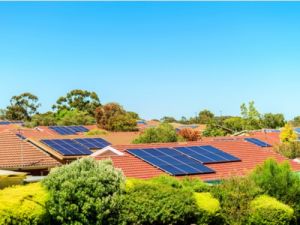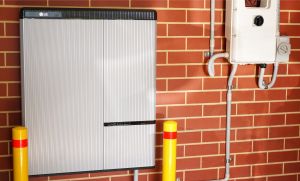Interested in solar energy but not sure if taking the leap is the right step for your household or business? You’ve come to the right place! The solar experts at Canstar Blue have broken down the top pros and cons of solar energy to help you decide – from costs and savings to efficiencies and maintenance.
Advantages and disadvantages of solar energy
Advertisement
Solar Energy Advantages
It’s hard to deny that getting solar has its benefits, but how far those benefits stretch may be new info to some. We’ve listed out five advantages you’ll face when installing solar.
Reduces your power bill
It’s why your neighbours have them and why your dad won’t stop talking about them – solar panels can help to reduce your power bill. When you’re generating your own electricity, you’re not using or paying for the electricity that comes from the grid. During the day, your solar panels will generate energy that is used in real time to power any appliances, lights or technology you have around the home, with any excess energy either stored in a solar battery for night usage or sold back to the grid.
Creates renewable energy
Undoubtedly one of the most common reasons people get solar panels – you’re relying less on the grid! But what does this actually mean? Well, for most of Australia, electricity is sourced from the National Electricity Market (NEM), which is made up by generation from a variety of energy sources, including coal, wind and hydro amongst others. A residential household can’t purchase electricity solely from a renewable energy generator, so creating your own renewable energy is the next best thing.
Lowers your household carbon emissions
Most of us are doing our part to be more environmentally-friendly, but with the energy industry contributing to a large portion of Australia’s emissions, reducing your reliance on the grid is one of the biggest individual impacts you can make. When households adopt a solar system, they’re reducing the demand for non-renewable energy that dominate our grid such as coal-fired. This, in combination with practicing general energy-efficiency, is a big leap in the right direction when considering your carbon footprint from energy consumption.
Excess power can be sold back into the grid
When you’re not using the energy generated by your solar panels, it’s either stored in a battery or put back into the grid, for which you’ll receive compensation called a ‘feed-in tariff’. Feed-in tariffs (FiT) are set by your retailer and some have even been known to set payment amounts to more than 20 cents per kilowatt hour (c/kWh) exported. However, unless you have quite a few panels, you probably won’t be making a killing from that money. Instead, it’ll help lower your power bills, even if only slightly.
Low maintenance
Much like with your car, you won’t always be able to rely on the rain to clean your solar panels. That being said, most people will only have to take a good look at their panels every six months or so, clearing them of dirt build-up if need be. Professional maintenance is also recommended by most installers, though this’ll only happen every few years and might even be covered by your upfront payment. Be sure to ask your supplier about any out of pocket maintenance costs.
Compare solar energy plans
Here are some of the cheapest solar-specific deals from the retailers on our database. These costs are based on the Ausgrid network in Sydney but prices will vary depending on your circumstances. We show one product per retailer, listed in order of lowest price first. Annual price estimates assume general energy usage of 3911kWh/year for a residential customer on a single rate tariff. Price estimates exclude solar feed-in tariff credits. These are products from referral partners†. Our database may not cover all deals in your area, and please check retailer websites for up to date information.
Here are some of the cheapest solar-specific deals from the retailers on our database. These costs are based on the Citipower network in Melbourne but prices will vary depending on your circumstances. We show one product per retailer, listed in order of lowest price first. Annual price estimates assume general energy usage of 4000kWh/year for a residential customer on a single rate tariff. Price estimates exclude solar feed-in tariff credits. These are products from referral partners†. Our database may not cover all deals in your area, and please check retailer websites for up to date information.
Here are some of the cheapest solar-specific deals from the retailers on our database. These costs are based on the Energex network in Brisbane but prices will vary depending on your circumstances. We show one product per retailer, listed in order of lowest price first. Annual price estimates assume general energy usage of 4613kWh/year for a residential customer on a single rate tariff. Price estimates exclude solar feed-in tariff credits. These are products from referral partners†. Our database may not cover all deals in your area, and please check retailer websites for up to date information.
Here are some of the cheapest solar-specific deals from the retailers on our database. These costs are based on SA Power network in Adelaide but prices will vary depending on your circumstances. We show one product per retailer, listed in order of lowest price first. Annual price estimates assume general energy usage of 4011kWh/year for a residential customer on a single rate tariff. Price estimates exclude solar feed-in tariff credits. These are products from referral partners†. Our database may not cover all deals in your area, and please check retailer websites for up to date information.
Solar Energy Disadvantages
Where there’s an up, there’s a down and there’s no exception when it comes to solar. Before making any costly decision, you have to weigh up the pros and cons, so we’ve listed out some of the biggest negatives to do with solar power.
High upfront cost
There’s no denying it, solar system costs aren’t cheap. You’ll pay for the panels themselves and then for someone to come and install them for you. This can cost a pretty penny. However, you may be eligible for a solar rebate depending on which state you live in, so be sure to check before you dive right in.
Battery storage is expensive
There’s no point sugar-coating it, the upfront cost of a battery storage system isn’t cheap. Not only that, but the more storage you need, the more expensive it will get. Starting from around $2,000 and reaching upwards of $20,000 for a higher capacity, battery storage systems are pricey even at the shallow end. The silver lining is that solar companies often run promotions when customers purchase solar panels and storage at the same time, so make sure you do your research before making a commitment.
May not suit your roof
The concentration of homes with solar panels decreases the closer you get to high-density cities. Why? There are many different reasons, but a big one is that the close proximity in which people live can impact a roof’s exposure to the sun. If you’ve got big trees or buildings near you, your roof may be partially shaded depending on the time of day. It’s always best to get a professional to come and inspect your home and lay out your best options.
Less production on overcast days
We all feel a little gloomy on overcast days, but solar panels do more than most. How much energy your solar panels generate will depend on how much sun is hitting them. On cloudier days, your panels won’t be working at max capacity, meaning you might have to make up the shortfall in power from the grid.
Become less efficient with time
As with any technology ever, solar panels and batteries will deteriorate over time. Solar panels are directly exposed to the elements, and while built with heavy duty materials and made to last, as a rule of thumb it’s thought that panels decrease in efficiency by 20% in approximately as many years. Batteries, whilst normally stored inside, will typically last for about 10 years before they begin to become significantly less effective. Make sure you check the warranty of your solar system to ensure the longevity of your investment.
Image credits: Federico Rostagno/shutterstock.com, amophoto_au/shutterstock.com, Milleflore Images/shutterstock.com, Rvector/shutterstock.com






Share this article